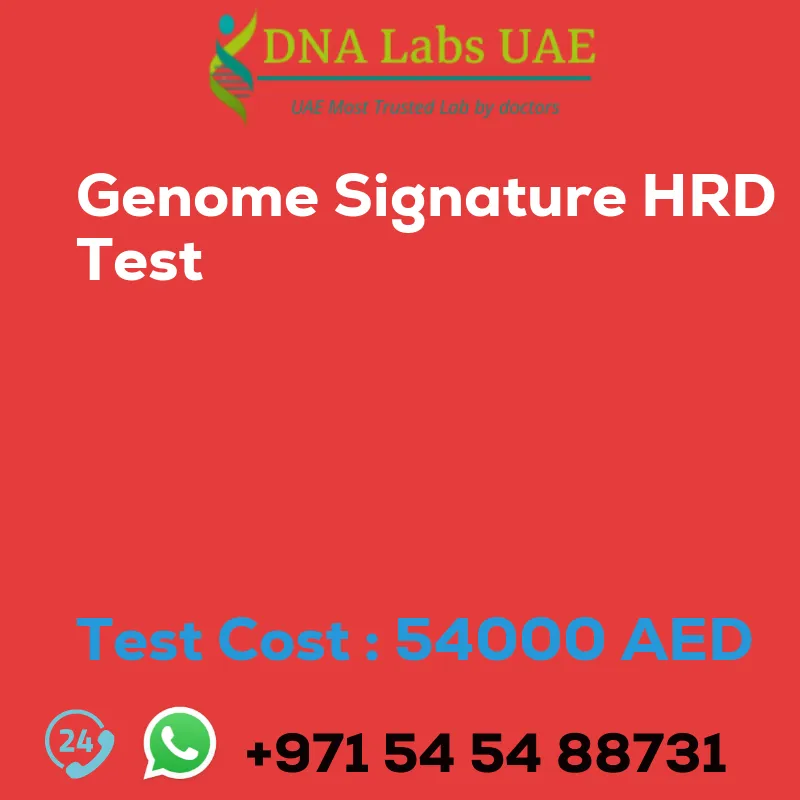Genome Signature HRD Test Price 54000 AED
Decoding Treatment Alternatives: Grasping the Genome Signature HRD Test in the UAE
Cancer treatment is perpetually advancing, with an increasing emphasis on individualized medicine. The Genome Signature HRD Test available in the UAE is a significant resource for detecting a particular genetic signature in certain cancers, potentially paving the way for targeted treatment alternatives.
Comprehending Homologous Recombination Deficiency (HRD) and Cancer
Our cells possess an extraordinary capability to mend DNA damage. Homologous recombination (HR) is a vital DNA repair pathway. When this pathway is impaired, a condition termed Homologous Recombination Deficiency (HRD) can emerge. In HRD-positive cancers, cells grapple to repair specific types of DNA damage, rendering them more susceptible to particular therapies.
What Constitutes the Genome Signature HRD Test?
The Genome Signature HRD Test scrutinizes your tumor’s genetic composition to evaluate its HRD status. Here’s a detailed look:
Cutting-Edge Technology: This test employs next-generation sequencing (NGS), a potent method that scrutinizes the entire genetic code (genome) of your tumor sample. Detecting HRD Signatures: The test seeks specific genetic modifications or patterns within your tumor’s DNA that signify impaired HR repair mechanisms.
Advantages of the Genome Signature HRD Test:
Targeted Treatment Alternatives: A positive HRD test result implies your cancer may be more responsive to PARP (Poly ADP-ribose polymerase) inhibitors. These drugs leverage the HRD defect in cancer cells, leading to their demise. Enhanced Treatment Outcomes: By pinpointing HRD-positive cancers, doctors can potentially customize treatment plans with PARP inhibitors, leading to improved response rates and potentially fewer side effects compared to conventional chemotherapy. Informed Decision-Making: The test results equip you and your doctor to make informed decisions regarding your treatment alternatives.
Who Can Gain from the Genome Signature HRD Test?
This test is particularly beneficial for individuals diagnosed with specific cancer types, such as:
Ovarian cancer Breast cancer Pancreatic cancer Prostate cancer It’s especially advantageous if you have a family history of these cancers or carry mutations in genes known to be associated with HRD, such as BRCA1 and BRCA2.
What to Anticipate During the Test?
The Genome Signature HRD Test typically involves collecting a tumor tissue sample through a biopsy or surgical procedure. The sample is then dispatched to a specialized laboratory for analysis. Results are usually available within a few weeks.
Important Considerations:
The cost of the Genome Signature HRD Test in the UAE can fluctuate depending on the healthcare facility. A positive HRD test result doesn’t assure a response to PARP inhibitors. Further consultations with your doctor are necessary to determine the most suitable treatment approach.
Venturing into Personalized Cancer Care
The Genome Signature HRD Test signifies a substantial stride towards personalized cancer treatment in the UAE. By understanding your tumor’s unique genetic composition, you and your doctor can explore targeted treatment alternatives like PARP inhibitors, potentially leading to a more effective and individualized approach to combating cancer.
Remember: Discussing with your doctor is crucial to understand if the Genome Signature HRD Test is appropriate for you and to discuss the implications of the test results in the context of your specific cancer diagnosis and treatment plan.
Test Details
The Genome Signature (HRD) refers to the measurement of genomic instability in a cancer cell’s DNA. HRD stands for Homologous Recombination Deficiency, which is a type of DNA repair pathway that is essential for maintaining genomic stability. When this pathway is deficient or impaired, it leads to an accumulation of DNA damage and genomic instability, which can increase the risk of cancer development and progression.
HRD can be measured through various genomic assays, such as the detection of genomic alterations and mutations in key genes involved in DNA repair and cell cycle regulation. HRD is often used as a biomarker for predicting the response to certain cancer treatments, such as PARP inhibitors, which target cancer cells with HRD defects.
Overall, HRD testing is an important tool for understanding the genomic landscape of cancer cells and developing personalized treatment strategies for cancer patients.
Test Components
- Paraffin embedded tissue blocks
- EDTA Vacutainer (2ml)
- Streck tube
Sample Condition
Tumor tissue + Peripheral Blood
Report Delivery
3-4 weeks
Method
Next Generation Sequencing (NGS)
Test Type
Genetics
Doctor
General Physician
Test Department
Pre Test Information
Genome Signature (HRD) can be done with a doctor’s prescription. Prescription is not applicable for surgery and pregnancy cases or people planning to travel abroad.
| Test Name | Genome Signature HRD Test |
|---|---|
| Components | Paraffin embedded tissue blocks+ EDTA Vacutainer (2ml)+Streck tube |
| Price | 54000.0 AED |
| Sample Condition | Tumor tissue + Peripheral Blood |
| Report Delivery | 3-4 weeks |
| Method | NGS |
| Test type | Genetics |
| Doctor | General Physician |
| Test Department: | |
| Pre Test Information | Genome Signature (HRD) can be done with a Doctors prescription. Prescription is not applicable for surgery and pregnancy cases or people planing to travel abroad. |
| Test Details | The Genome Signature (HRD) refers to the measurement of genomic instability in a cancer cell’s DNA. HRD stands for Homologous Recombination Deficiency, which is a type of DNA repair pathway that is essential for maintaining genomic stability. When this pathway is deficient or impaired, it leads to an accumulation of DNA damage and genomic instability, which can increase the risk of cancer development and progression.HRD can be measured through various genomic assays, such as the detection of genomic alterations and mutations in key genes involved in DNA repair and cell cycle regulation. HRD is often used as a biomarker for predicting the response to certain cancer treatments, such as PARP inhibitors, which target cancer cells with HRD defects.
Overall, HRD testing is an important tool for understanding the genomic landscape of cancer cells and developing personalized treatment strategies for cancer patients. |






